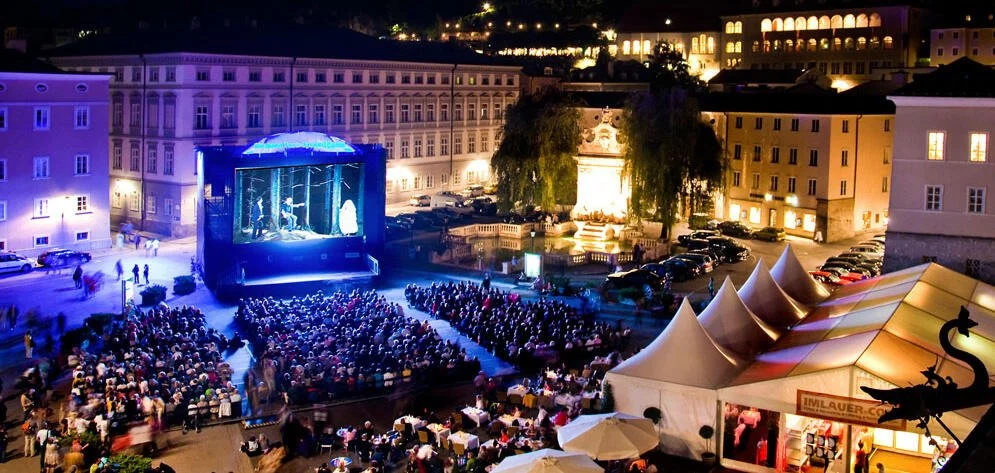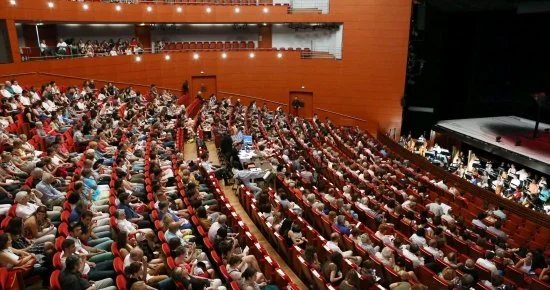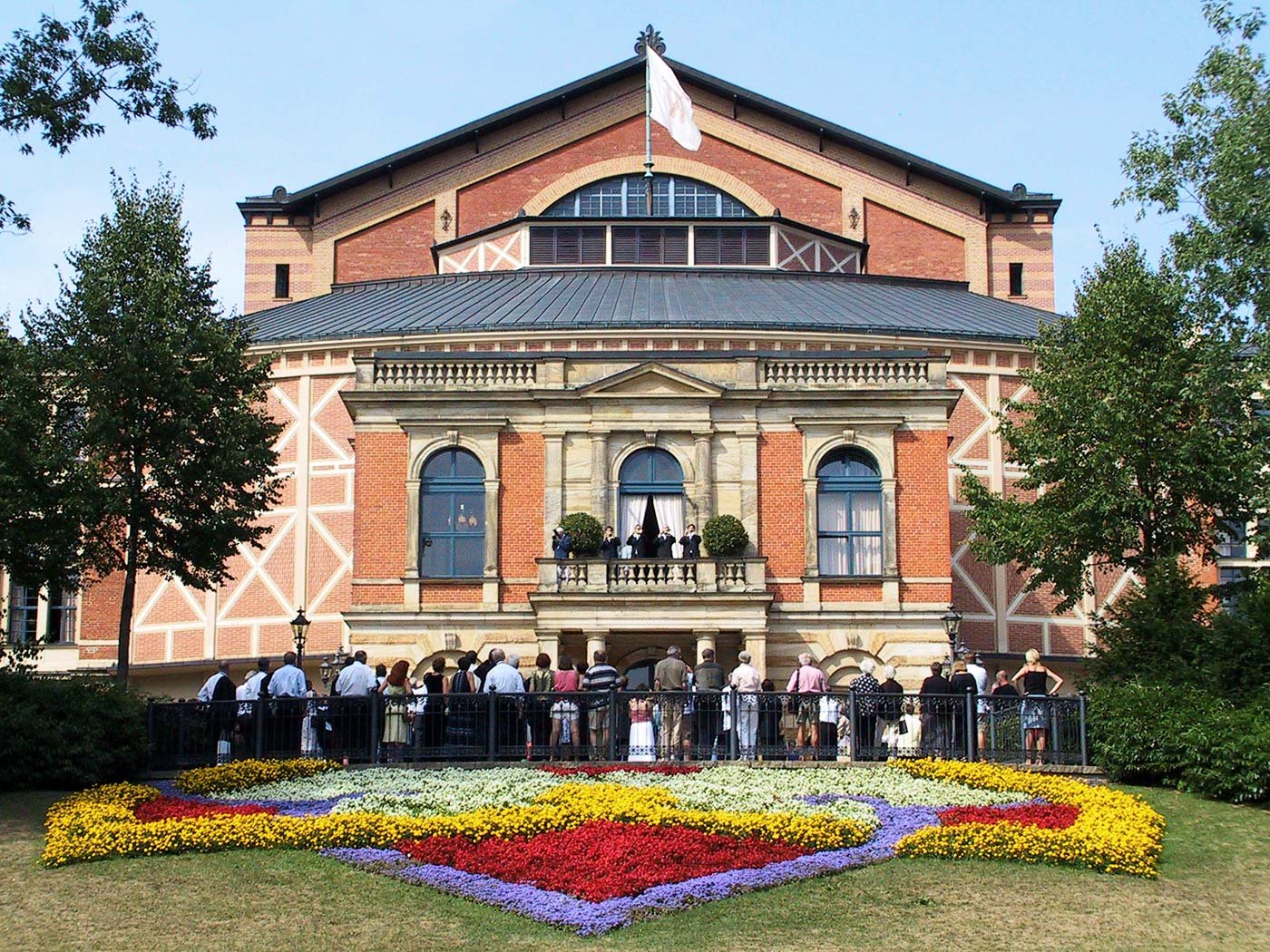Festivals: Salzburg, Aix-en-Provence, Bayreuth
In my first article about Festivals, I spent some time writing about my own city, and the Edinburgh Festival, how it inspired me, and has continued to play a part in my life. One of the joys of the 2021 Edinburgh International Festival was that, in my new disguise as a writer, I was able to attend several performances as a critic. It gave me great pleasure to be involved with the festival from an entirely different angle. I have always tried to be in Edinburgh in August each year, as the Festival has provided me with a focus for my busy career, which has involved many years of travelling and singing far from home. My long-suffering wife and children have had to put up with an absentee for so long, that, if at all possible, I would try to schedule most of the three weeks of the Festival at home. I have usually arranged to sing at least one concert in Edinburgh, both to remind my friends that I am still working, albeit rarely here, and also because it is so hard to find time for recitals in the rest of the year. I have found that, unless one is known as a recitalist, and basses rarely are, it is only at the beginning and end of careers that one gets the chance to sing song recitals. This has been a shame, as I love the experience of singing alone with just a pianist and having the chance to explore different colours in my voice. As an operatic bass, one is usually forced to sing either loudly or very loudly, in order to be heard over a full orchestra. Recitals require a completely different set of colours, and a much closer attention to detail. I have managed to sing almost all the great song cycles over the years, with a variety of accompanists, including Schubert’s Winterreise and Schwanengesang, Brahms’ Four Serious Songs, Ibert’s ‘Don Quichotte’, Beethoven’s ‘An die ferne Geliebte’, Mussorgsky’s ‘Songs and Dances of Death’ and Vaughan Williams’ ‘Songs of Travel’. Other recitals have focussed on particular composers, or have had a theme, or have introduced other singers. This year, I was able to introduce the wonderful Beth Taylor to an Edinburgh audience, and will, no doubt, come up with something interesting next year.
My work as a critic enabled me to hear some marvellous music, non-vocal by choice (I refuse to write about my friends), and to admire the way different instrumentalists make music. I have never liked the word “critic” in this context, since, yes, one has to be objective and fair minded when writing about performances, but I prefer to look for felicities rather than criticise or nit-pick. I hope my reviews are fair but also helpful, both for performers and audience alike. The great advantage of reviewing the Edinburgh Festival is that the standard is so high.
Salzburg, Austria
The only other Festival in the world which can be compared to Edinburgh is the Salzburg Festival, in that wonderful small city, deep in the Austrian Alps, where Mozart grew up. It is by no means just a Mozart Festival, but the whole town is imbued with his memory and his influence.
The festival was founded after the First World War by Hugo von Hofmannsthal, Richard Strauss, Alfred Roller, Franz Schalk and Max Reinhardt, and opened in 1920 with a performance of Hofmannsthal’s play ‘Jedermann’ (Everyman) on the steps of Salzburg Cathedral, directed by Max Reinhardt. It was first played in Berlin in 1911, and is based on the old mediaeval tradition of the Morality Play, in which personifications of the Virtues and Vices, along with various heavenly or hellish accomplices, try to persuade a generic human figure to change his/her ways. A common theme is temptation, fall and redemption. The founders were trying to establish in Salzburg, the antithesis of the Prussian military ethos which had been responsible, to an extent, for the First World War.
In the early 1920s, the Festival developed into more of a musical event, with concerts and operas, featuring some of the world’s great musicians. Apart from the grotesque years of Nazi dominance in Austria, the Salzburg Festival has been a beacon of excellence, and has welcomed artists to its halls and theatres. Under the leadership of Herbert von Karajan, from 1956 -1989, it established itself as the premier music festival in mainland Europe, with priority given to Mozart and Richard Strauss. Since then, it has diversified under a variety of different directors, but still retains its kudos. In the 1990’s, more baroque music featured at the Salzburg Festival, and I was privileged to sing there with Trevor Pinnock and the English Concert in 1992.
I had recorded and toured with the English Concert in 1991 with Purcell’s ‘King Arthur’, and Trevor was due to record Mozart’s re-orchestration of Handel’s ‘Acis and Galatea’ the following year, along with an appearance at the Salzburg Festival. The great English bass, John Tomlinson, was booked for the recording, but could not sing in Salzburg because he was singing Wotan in Wagner’s ‘Ring Cycle’ at the Bayreuth Festival, so Trevor asked me to sing Polyphemus in Salzburg. This version, in German with Mozartian quirks like clarinets, and horns instead of trumpets at some points, is a historical rarity, but worth hearing, and along with Barbara Bonney, a very young Jamie MacDougall and Markus Schäfer, I sang in the Mozarteum University Hall in Salzburg with the magnificent English Concert, the premier baroque orchestra of the time. This was one of the high points of my entire career, and just walking around the city, bedecked with posters of all the famous artists taking part, including Trevor, was an immense thrill. The Deutsche Grammophon company was everywhere in the Festival (the English Concert had an exclusive contact at that time with DG Archiv), and I really felt quite special. The performance was fabulous, and I’ll never forget it. Jamie and I went on to sing the original Handel ‘Acis and Galatea’, again with Trevor, in Ottawa in Canada, and I sang it again with the English Concert and Trevor in the Halle Festival (see below) in 1997.
Aix-en-Provence, France
Somewhat to the south of Salzburg, there is another festival that is dear to my heart, Aix-en-Provence. It was founded just after World War Two by Countess Lily Pastré, a philanthropist who had also kept hidden many Jews during the war. The countess had inherited a large part of the Noilly-Prat fortune, as the great grand-daughter of Claudius Prat, one of the co-founders of the vermouth company, and she financed all of the opening festival, which put on concerts in various locations, notably the courtyard of the Archbishop’s palace in Aix, known as the Archevêché. The combination of a beautiful location, the wonderful Provence summers, and high-quality music-making has turned the festival into one of the delights of the summer season in Europe.
My first visit there was in 2001, to sing Doctor Bartolo in Mozart’s ‘Le Nozze di Figaro’ (The Marriage of Figaro), still my favourite Mozart opera. The Festival had assembled a world class cast, with wonderful singers like Véronique Gens, Laurent Naouri, Magdalena Kožená (the present Mrs Rattle) and Jennifer Smith, with Marc Minkowski conducting the Mahler Chamber Orchestra, and directed by the great English director Sir Richard Eyre. We played in the newly refurbished Théâtre de l’ Archevêché, an open-air stage with lovely acoustics, built into the old archiepiscopal buildings. Performances start after 9pm, as the sun has largely set by then, and it is a truly magical place to sing. Later that same year, we toured Figaro to Tokyo, and had a great success there.
A new purpose-built theatre, le Grand Théâtre de Provence, opened in 2007 to allow larger-scale operas to be performed indoors, and I saw several splendid shows there.
I returned to Aix in 2011 for a completely different project, the world premiere of Oscar Bianchi’s opera, ‘Thanks to my Eyes’, a fiendishly difficult modern piece written in English, translated from the French play ‘Grace à mes Yeux’ by Joel Pommerat, who also directed it. We played in the beautiful little theatre, Le Jeu de Paumes, an exquisite 18th century jewel tucked away in the old town of Aix. We had the amazing Ensemble Moderne, one of the finest contemporary music orchestras in the world, based in Frankfurt, playing with us, conducted by Frank Ollu. It was one of the strangest experiences of my career, but I rather enjoyed in, and we toured the show to Brussels, Paris and Lisbon the following year.
My last appearance at the Aix-en-Provence Festival was in 2015, when I sang Snug in Robert Carsen’s famous production of Britten’s ‘A Midsummer Night’s Dream’, which had premiered in Aix in 1991. This production, with its bright colours and perfect pacing, is rightly renowned, and the superb cast had a huge success in the Archevêché. The orchestra of the Opéra National de Lyon were in the pit, conducted by the Japanese maestro, Kazushi Ono. We took the production to Beijing later that year. One of the joys of Aix, apart from the location and the weather, and the wonderful rosé wine from Provence, is that nearly every major show gets to tour somewhere else afterwards. Our tour to China, supported by the K T Wong Foundation, allowed me to sing in yet another festival, the Beijing Music Festival!
Bayreuth, Bavaria, Germany
My final Festival in this article is another of the big ones, Bayreuth, the Wagner festival in the small Bavarian town, which opened on 13th August 1876, with ‘Das Rheingold’’, the opening part of Wagner’s huge cycle ‘Der Ring des Nibelungen’. Sadly, I have never appeared in the festival, but I have attended it and I have sung on the stage.
The first night in 1876 must have been amazing. The whole enormous work, lasting in total about 15 hours, begins with one note, a very low E flat. From this embryonic sound, everything follows, as the music describes the flow of the river Rhine itself. Wagner designed the original theatre, the Festspielhaus, to fit in with his vision of the opera of the future. The auditorium is one vast semi-circle, with rows of banked, uncomfortable seats, offering an unimpaired view of the stage for everyone. The stage covers and obscures the huge orchestra pit from view, but the acoustic is perfect. The singers can project easily into the auditorium, without fighting against the noise of a full symphony orchestra, and yet, the audience hears every detail of the instrumental score. It is a miracle of theatre design, created in an era when theatres were still largely primitive, technically. You need to possess a voice of some weight and strength, nonetheless, but many of the problems which force singers to shout and yell to be heard, are eradicated. The design also allows the stage and the auditorium to be in quasi-darkness, while the players have light enough to read their music. When I attended the Festival in 1990, my first experience of the theatre was the prelude to Lohengrin, a magical, ethereal start high in the strings. The entire place was in apparent darkness, and yet I was able to listen to this extraordinary prelude, evoking the Holy Grail and all its mystery, in a live theatre, packed with people. It would not be fanciful to say that I had never heard anything as beautiful in my life (I was 35), and I still treasure that memory to this day.
The great and the good have always come to the Bayreuth Festival. Amongst the audience on that first night in 1876 were Kaiser Wilhelm I of Prussia, Emperor Pedro II of Brazil, representatives of most of Europe’s royal houses and governments, and the composers Tchaikovsky, Bruckner, Saint-Saëns, Gounod, Grieg and Liszt. King Ludwig II of Bavaria, Wagner’s sponsor and saviour, had attended the Dress Rehearsal, incognito, as his popularity was at a low ebb at that time. Then, and now, the small town of Bayreuth struggled to cope with the influx of so many visitors, many of whom had, to say the least, major accommodation requirements. My requirements in 1990 were more modest, and I must say, I have no memory of where I stayed. I had been awarded the London Wagner Society Bursary and Stipend that year, in recognition of my emergent status as a promising young professional. It gave me a long weekend in Bayreuth, with tickets for three operas, “Lohengrin”, “The Flying Dutchman” and “Parsifal”, and that weekend must rank as one of my life treasures. I kept a detailed diary, which reveals that I was already sharpening my pen as a critic, as I made some less than approving comments, mostly about the basses I heard! However, the overall impression was of total delight, and even the weather was wonderful. I had arranged to sing an audition when I was there, as Eva Wagner had heard me sometime before in London. She is the daughter of Wolfgang Wagner (the composer’s grandson, and Liszt’s great-grandson), and, at that time assisted her father in Bayreuth, and was involved in various opera companies throughout Europe. I sang Hagen’s Watch, the wonderful, brooding solo sung by the evil Hagen in ‘Gőtterdämmerung’, and so can say I have sung on the stage at Bayreuth. It’s an odd experience, as the unusual design makes for a different feel from other theatres, and nothing came of the audition, but I consider myself lucky at least to have sung there!
My good friend, David Moncur (who I have known since we were four), came along on the trip, and although I only had the one ticket, he sat outside the theatre, listening to the music wafting over the outer buildings, and joined me for drinks at the intervals. Although a great summer ‘Event’, the Bayreuth Festival is not, unlike Glyndebourne and Salzburg, a place just to be seen. The very long operas (not to most corporate clients’ taste) and the extremely uncomfortable seats combine to produce an audience of opera lovers, people who have saved and waited, sometimes for years, to get tickets, which are like gold dust. I was immensely fortunate!
Next time, I’ll tell you about some other smaller festivals, and some obscure ones!


